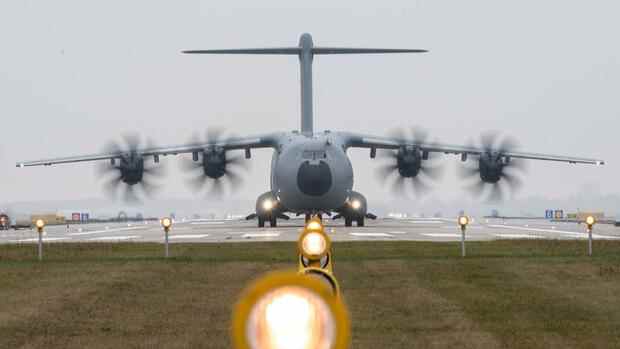Numerous special requests from the ordering nations have delayed the project and made it more expensive.
(Photo: dpa)
Berlin With 100 billion euros – in addition to the regular defense budget – the Bundeswehr is to be made fit again for the defense of the country and the alliance. That’s a lot of money. But it can only be effective if the necessary equipment can be procured quickly.
Defense Minister Christine Lambrecht (SPD) knows that too. You often hear that politicians must finally reform the procurement system, she said last Wednesday in the Bundestag. “Yes, of course! We’ll get to that now,” the minister promised.
This Monday, Lambrecht will meet with coalition defense and budget leaders to explore ways to speed up the processes. For example, better requirements management is necessary, said the spokesman for the FDP parliamentary group for defense technology and procurement, Alexander Müller, the Handelsblatt.
Previously, all the requests from the troops were simply written down and brought together, including many special requests that made procurement projects extremely expensive.
Top jobs of the day
Find the best jobs now and
be notified by email.
Extras requested by Germany and other project nations, for example, drove up the cost of the Airbus A400M military transporter and delayed delivery. “We have to pay much more attention to market availability here,” demands Müller. Additional requests should only be allowed if they have a really high priority.
You can read more about the Ukraine war here:
In addition, purchases should not be delayed because vehicles have to meet the strictest emission standards or the interior lighting of tanks has to comply with workplace regulations. In addition to the Tornado successor for nuclear sharing, the Bundeswehr’s larger procurement projects also include heavy transport helicopters. In both cases, the Bundeswehr now wants to buy “off the peg” from the Americans in order to avoid delays.
The Liberals have collected other proposals for the meeting with the defense minister. For example, they want to relieve the Bundeswehr procurement office in Koblenz, which has all too often proved to be a critical bottleneck, by allowing more decentralized orders.
The federal government has already raised the threshold up to which you can buy freely without a tender from 1,000 to 5,000 euros. A further increase could help here. Consideration should also be given to increasing the “earnings money” of EUR 25,000 per year, which commanders can use to purchase simple equipment or spare parts.
The defense experts of the FDP also want to make the armaments industry more responsible – for example through contracts that take into account the operational readiness of the device. The idea: The manufacturer receives fixed rates per hour of use, but is responsible for spare parts management and maintenance capacities. If the devices are not ready for use, no money flows. “In this way, the right incentives are set to keep commitment at the highest level,” says Müller.
More pressure on manufacturers, fewer complaints
In the future, the federal government will no longer be allowed to purchase and pay for any material that cannot be used for years without upgrades. Here more pressure must be exerted on the manufacturers through higher contractual penalties, which are currently limited to five percent of the price.
Procurement processes are often delayed because companies that have been unsuccessful in tenders complain. For example, there are a number of proceedings due to the Bundeswehr order for a new assault rifle, which is worth up to 250 million euros.
If the liberals have their way, the federal government should return to the old legal situation, according to which urgent armaments could be procured quickly without waiting for the court process. Depending on the outcome of the lawsuit, damages may then be due. According to the current legal situation, one must first wait until the legal dispute has been decided, which often takes years.
More: Germany and France – Friendship ends with armaments
